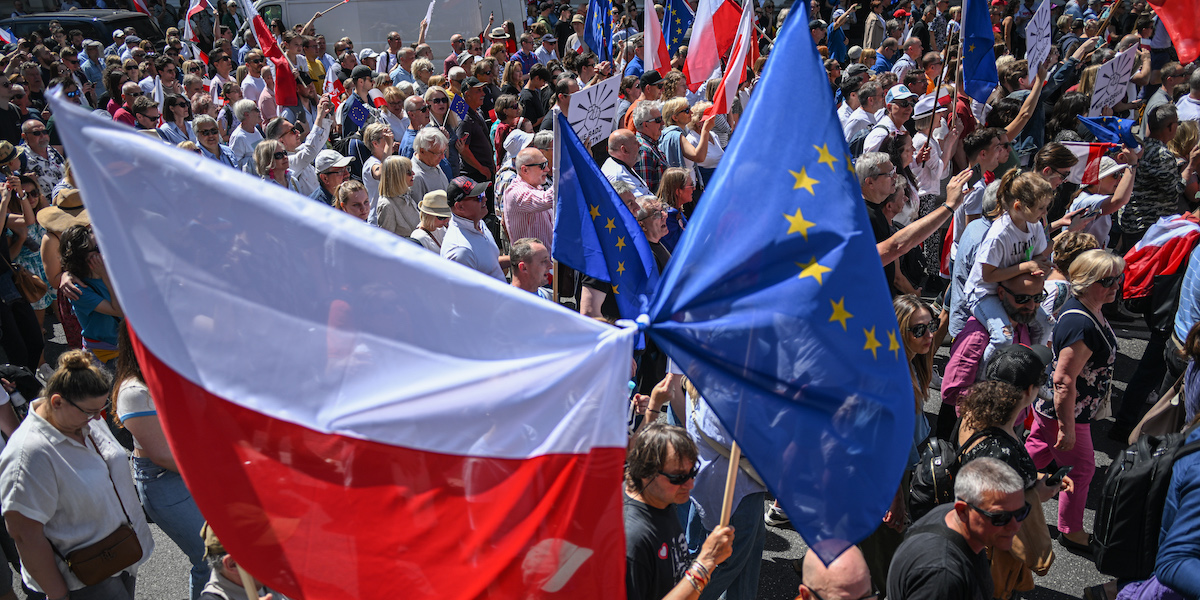In Warsaw, the capital of Poland, hundreds of thousands of people are participating in a large demonstration against the right-wing government. The demonstration was organized by the main opposition leader Donald Tusk, head of the centre-right liberal and pro-European Civic Platform party. The government is accused of progressively weakening democracy in the country, which is perceived by a large part of the population as really in danger for the first time since the end of the communist regime in 1989.
The decision to organize the demonstration on June 4 is strongly symbolic, because it is the day to which the return of democratic institutions in Poland is formally traced back, and it is a national holiday.
Tusk, who was prime minister of the country from 2007 to 2014 and president of the European Council from 2014 to 2019, convinced many people to meet in Warsaw by leveraging precisely the fear that democracy in the country would be further compromised. Political elections will be held in Poland in October (the precise date has not yet been set) and Tusk spoke of them as the last opportunity to change the direction of the government and get closer to the European Union, within which the country is repeatedly accused of not respecting the rule of law and is now considered one of the most Eurosceptics, like Victor Orbán’s Hungary.
The ruling party, Law and Justice, has governed since 2015 and over the years has gathered a large consensus thanks to conservative positions and very close to those of the Catholic Church, which represents the majority of the faithful in Poland, but also by spending a lot on social. At the same time, however, the Law and Justice government, currently led by Prime Minister Mateusz Morawiecki, has become increasingly illiberal: it has approved very strict laws against abortion and has taken sides against minorities, in particular the LGBTQ+, and is accused by the European institutions of having greatly reduced the independence of the courts and the judiciary.
Donald Tusk, in the center, among the protesters (Omar Marques/Getty Images)
However, the large turnout in Sunday’s protests and support for Tusk seem to have been fueled in particular by the recent approval of a highly controversial law, which allows the government to create a special commission to investigate alleged Russian influences in Poland. Although Russia is generally very frowned upon in Poland – the country is among those that have come out with the most strength and support for Ukraine since the invasion – the law has received a lot of criticism because the commission is believed to have been given powers unconstitutional, according to which the government could instrumentally decide to persecute its political opponents with specious accusations and exclude them from public life for years.
Tusk is the main suspect to become a target of this new commission, because he has already been accused in the past of being too nice to Russia during his years as prime minister, when among other things he made gas deals considered particularly favorable to Russia . Critics have started ironically calling the law “Lex Tusk”.
In general, many believe that the special commission could be used by the government to influence the electoral campaign and the October elections: the results of its investigations are expected to be presented on September 17, shortly before the elections, and among its faculties c ‘is also to ban politicians and officials for 10 years from roles involving the management of public funds.
The law was signed by President Andrzej Duda, who is part of the governing Law and Justice party, on May 29. After many protests, however, a few days later, on Friday 2 June, Duda himself had unusually proposed some amendments, including the fact that the law was reviewed by non-partisan experts and that MPs were not allowed to be part of the commission: the amendments be voted on by parliament, in times that cannot be foreseen at the moment, but in the meantime the law will enter into force on Monday.
Świętokrzyska metro station in Warsaw right now. Even an hour after the anti-government protest started today, people are still pouring into the city center #March4June pic.twitter.com/ZSQ60shOU0
— Michael Kranz (@Michal_Kranz) June 4, 2023
According to the organizers, over one and a half million people are demonstrating in Warsaw, arriving from different parts of the country. Authorities have not provided their own official estimate. According to non-governmental media it is one of the largest protests in post-communist Poland. After the passage of the law on the special commission, other opposition politicians, initially dubious, also decided to join the protests. Law and Justice instead strongly discouraged participation, even publishing a propaganda video in which some images of the Nazi concentration camp of Auschwitz, located in Poland, were associated with the protest march of the opposition: this attracted new criticisms to the party and probably further fueled the protests.
